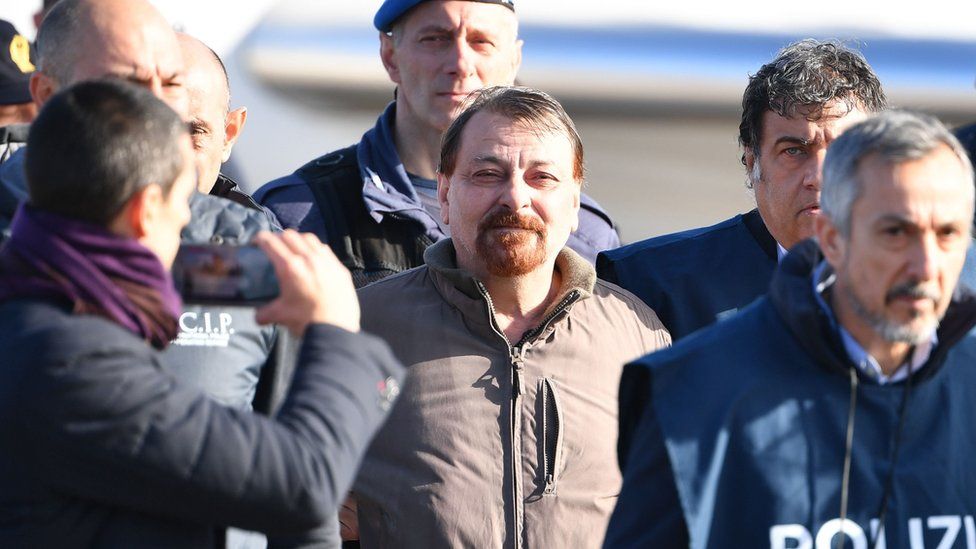Cesare Battisti: Ex-militant extradited by Bolivia arrives in Italy
- Published

An Italian former militant communist captured in Bolivia has arrived in Rome, officials have confirmed.
Cesare Battisti, 64, was extradited after being found in Santa Cruz de La Sierra on Saturday in an international police operation.
Battisti was two years into a 12-year sentence in Italy when he escaped from prison in 1981.
He was subsequently sentenced in absentia to life in jail for four murders carried out during the 1970s.
Battisti had lived for years in Brazil but vanished after an arrest warrant was issued last month.
The Falcon 900 plane landed at Ciampino airport on Monday morning, and Battisti was escorted off the plane by a dozen police officers.
Italy's interior minister, Matteo Salvini, who was waiting at the airport, said: "We've got him. And now he'll have to rot in jail."
Local media report Battisti will be taken to Rebibbia jail, where he will serve his life sentence. It will reportedly start with six months of solitary confinement.
In a message on Facebook ahead of the extradition, Prime Minister Giuseppe Conte said: "We are satisfied with this result that our country has been awaiting for too many years."
He thanked the Bolivian authorities and singled out Brazilian President Jair Bolsonaro for his "effective co-operation" that led to Battisti's capture.
The far-right Brazilian leader, who took office on 1 January, had pledged to extradite Battisti.
How was he arrested?
Battisti was alone and wearing sunglasses and a fake beard when he was arrested, according to Italian newspaper Corriere della Sera.
Bolivian Interior Minister Carlos Romero said the fugitive had entered the country illegally.
Italian police published a video on Twitter that purports to show him moments before his arrest.
Allow Twitter content?
This article contains content provided by Twitter. We ask for your permission before anything is loaded, as they may be using cookies and other technologies. You may want to read Twitter’s cookie policy, external and privacy policy, external before accepting. To view this content choose ‘accept and continue’.
Battisti spent years in Brazil as a refugee, with the support of former left-wing President Luiz Inácio Lula da Silva.
But Lula's successor, President Michel Temer, revoked his status as a permanent resident in December, when an arrest warrant was issued.
Battisti, who has a five-year-old Brazilian son, said in 2017 that he would face "torture" and death if he returned to Italy.
In December, Brazil's Federal Police released a picture showing possible disguises that Battisti might use.
Brazilian politician Eduardo Bolsonaro, one of the president's sons, tweeted to Mr Salvini: "Brazil is no longer a land of bandits. The 'little gift' is coming."
'Years of lead'
In 1979, Battisti was jailed for belonging to a far-left group that had been banned in Italy - the Armed Proletarians for Communism (PAC).
After escaping, he spent almost a decade on the run and arrived in France in 1990. That was the year he was convicted of killing four people, including two Italian law officials.
Battisti has admitted being part of the PAC but denies responsibility for the murders. Instead, he describes himself as a political refugee.
While in France, he joined a group of fellow left-wing Italian militants who were granted official protection by France's then-socialist president Francois Mitterrand.
At the time, France was offering sanctuary to former leftist militants from Italy who had renounced their violent pasts - an offer taken up by several former guerrillas.
These militants had, like Battisti, also escaped a particularly violent period of recent Italian history in the 1970s and 1980s. That era is now known as "anni di piombo" (years of lead) - referring to the vast number of bullets fired.
During this time, militants on both ends of the political spectrum carried out assassinations, bombings and other violent attacks, with the aim of overthrowing the Italian government.
It was in France that Battisti began a successful career as a writer, publishing a number of crime novels.
But in 2004 the political situation in France changed, and former militants were no longer protected. To avoid extradition, Battisti moved to Mexico and later to Brazil.
He was arrested by Brazilian authorities in 2007 and jailed, prompting the Italian government to put in another extradition request.
President Lula rejected the request on his last day in office - a move that angered Italy, which withdrew its ambassador.
Battisti was released from prison in Brazil in 2011, and enjoyed relative protection until Mr Bolsonaro's election success at the end of last year.
- Published14 December 2018
- Published5 October 2017
- Published31 December 2018